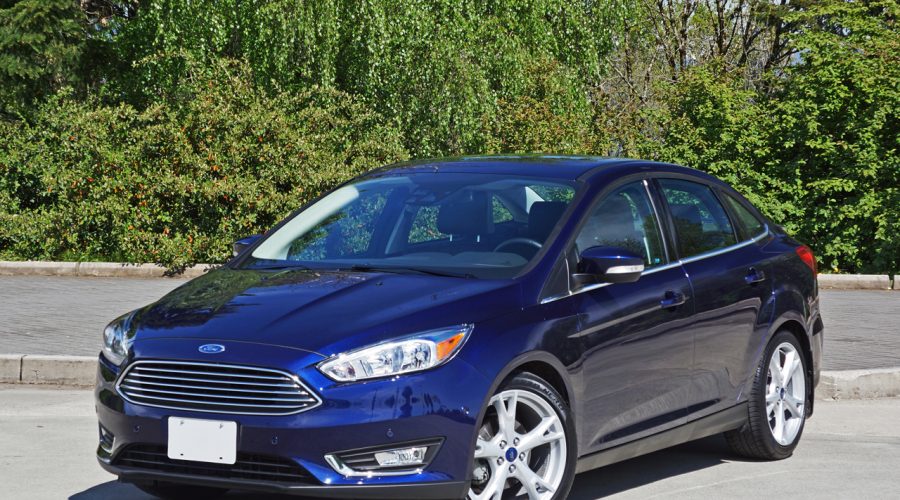Other than the class-dominating Mustang, Ford doesn’t enjoy quite the same level of sales success with its car program as it
 |
| Photo: Trevor Hofmann, Canadian Auto Press |
does with its top-selling trucks and SUVs, but its Fiesta, Focus, Fusion and Taurus are important players within their respective segments just the same.
The Focus is especially noteworthy due to the sheer number of models that carry its nameplate, which include both four-door sedan and five-door hatchback body styles, with high-performance ST and RS variants as well as an all-electric version of the latter, plus unique luxury trimmed Titanium editions of both sedan and hatch. You’d think with this much on offer the blue-oval brand would be number one in its category, but compact competition is fierce in Canada and the imports have long held the lead.
The question of sales leadership becomes even more puzzling when factoring in just how superbly finished and advanced the Focus is, from its forward thinking mechanical
 |
| Photo: Trevor Hofmann, Canadian Auto Press |
technologies to its leading infotainment, but unfortunately distant memories of quality problems and the recalls that followed still linger from the early aughts, while the new version has hardly been the poster child of dependability.
Using recalls as an indicator of problems, the current 2016 Focus has actually been perfect with zero recalls while there was only one for the 2015 model, although 2014 was challenging with a total of five. There were four recalls for the 2013 model (some being the same problem overlapping into different years) and three for the 2012 (none of these for airbags, by the way). While this might seem a bit dismal it was a walk in the park compared to the Focus’ original 2000 model year that underwent nine separate recalls, although what matters more is comparing the Focus’ five most recent years with the compact segment’s top sellers,
 |
| Photo: Trevor Hofmann, Canadian Auto Press |
the first-place Honda Civic already faced with one for the 2016 model year albeit none for 2015, just one for 2014, two for 2013 and two for 2012; the second-place Toyota Corolla experiencing a mere single recall in 2014; the third-place Hyundai Elantra already hit with one for 2017 but only experiencing one in 2014 and another in 2012; the fourth-place Mazda3 troubled by one in 2016, the same issue affecting the 2015 model and another issue in 2014; and the fifth-place Chevy Cruze plagued with one in 2016, two in 2015, four in 2014, five in 2013, and six in 2012 (airbags were only problematic with one of these recalls and had nothing to do with Takata, and ignition switches weren’t even on the list, but rather affected Cobalt models that preceded the Cruze). That Chevy makes Ford look pretty good, don’t you think?
While negatives in the news affect word on the street, not to mention an owner’s willingness
 |
| Photo: Karen Tuggay, Canadian Auto Press |
to make a repeat purchase when it comes time to trade in let alone remain with the brand, quality issues with respect to recalls and reliability have nothing to do with a car’s perceived quality at the time of purchase, or in the case of we auto scribes, at the time of our test drive. It’s possible for something to go wrong during a given weeklong loan, but chances are slim and issues are usually very minor. My very first Focus tester was a 2002 model, followed by a jaunt in a not-for-sale 2003 fuel cell version, and then a bevy of 2005 models at a press launch, the then-new 2012 model, another 2012 in Titanium trim, three 2013 models including a Focus Electric, Titanium and ST, a more pedestrian 2014 in SE trim and then another 2016 ST, plus I’ve been editor for numerous other journalists testing many more Focus models over the past 15 years and never once have I personally experienced or ever heard about any problem arising.
Still,
 |
| Photo: Karen Tuggay, Canadian Auto Press |
the single piece of “hate” mail from a reader this year was from a disgruntled Focus owner who said we journos should be researching the cars we review more thoroughly before giving them our recommendations so here I am talking recalls and reliability, Consumer Reports recently backing me up with respect to the latter by giving the Focus a minus-118 rating (certainly not the worst they’ve dealt) while message boards and gripe sites are filled with owners complaining about lurching transmissions at takeoff (remember that advanced technology I mentioned earlier?).
If I was the one putting my money down, however, I’d choose one of Ford’s dual-clutch automated gearboxes over a continuously variable (CVT) any day of the week, Ford spending way more to develop this sophisticated transmission than most
 |
| Photo: Karen Tuggay, Canadian Auto Press |
rivals relegating it in with such notable brands as Ferrari, Lamborghini, McLaren, Porsche, Audi, BMW etcetera, plus VW. Dual-clutch boxes might not be quite as smooth as CVTs or multi-speed automatics, they automatically swap manual transmission cogs after all, but they’re brilliantly quick shifting and suitably efficient, while some of the new eight- and nine-speed automatics have been a lot more troublesome.
My most recent 2016 Focus Titanium Sedan tester featured this six-speed dual-clutch automated PowerShift gearbox with SelectShift manual mode, and I never experienced anything more than a very slight hesitation at launch that was countered by ultra-smooth, lightning quick shifts while up to speed, yet its fuel economy was superb despite the performance delivered, my personal results only slightly
 |
| Photo: Karen Tuggay, Canadian Auto Press |
higher than its five-cycle rating of 7.7 L/100km combined city and highway. While the autobox comes standard it should be noted a five-speed manual is available, that combination good for 8.0 combined.
The direct-injection 2.0-litre four-cylinder is plenty energetic with 160 horsepower and 146 lb-ft of torque, which with Sport mode engaged made for quick getaways and loads of highway passing power, while few compacts can keep up with the Focus on a curving road, the Titanium standard with Torque Vectoring Control that automatically applies braking to the front inside wheel so that more power goes to the more adherent outside wheel, my tester also upgraded with a set of slick-looking optional five-Y-spoke silver-painted 18-inch alloys on 235/40ZR18 Pirelli P Zero Neros. The performance tires didn’t seem to upset ride comfort, this luxe compact’s
 |
| Photo: Karen Tuggay, Canadian Auto Press |
fully independent front strut and multi-link rear suspension wonderfully compliant over rougher pavement and quite smooth around town, while its ABS-enhanced four-wheel disc brakes proved easy to operate during regular driving and extremely effective during panic testing situations.
I mentioned luxe, but you still may not be fully prepared for the premium way Ford has dressed up this top-line Focus. Let’s first point out that there’s no Lincoln version of this car and then appreciate that Ford is making up for this big time with Titanium trim, fitting premium soft touch synthetics across the entire dash top, right down to the midpoint of the instrument panel, not to mention more than halfway
 |
| Photo: Karen Tuggay, Canadian Auto Press |
down the sides of the centre stack, whereas the front door uppers get the high-end treatment too. Applying such expensive material to both areas is unusual in the compact class, but so is this Titanium’s nicely padded and stitched leather sport steering wheel, complete with comfortably shaped thumb spats at the 9 and 3 o’clock positions, while the shift knob is comprised of leather as well as metallic trim, the left side incorporating a thumb actuated toggle for rowing through gears. A sporty leather boot finishes off the shift lever, the surrounding trim done out in an attractive gloss dark grey that’s duplicated over on the door pulls, while key areas are highlighted with ambient LED lighting.
On top of all this is extremely high quality switchgear throughout the cabin, Ford doing
 |
| Photo: Karen Tuggay, Canadian Auto Press |
a better job than many rivals with tighter fitting, better damped controls made from more substantive plastic than the hollowed out cheap plastic buttons, knobs and toggles offered by a number of very pricey luxury brands. Another Focus attribute is its combination of digital interfaces, the Titanium including a bright, full-colour, high-resolution multi-information display between a set of analog primary gauges, filled with stylish graphics and loads of info accessible via steering wheel controls.
Atop the centre stack is one of the best infotainment systems in the industry (insert advanced tech reminder here), Ford’s new Sync 3 that includes Apple CarPlay and Android Auto as well as downloadable apps and available navigation with excellent mapping and accurate, quick responding route guidance. The graphic design of the interface is modern and refreshing, especially if you like light blue
 |
| Photo: Karen Tuggay, Canadian Auto Press |
on white, while tablet-style pinch and swipe capability makes it easy to operate. Strangely its voice recognition actually comprehends audible prompts and its functions are easier to setup than the old MyFord Touch system, while features include the expected rearview camera with active guidelines, top-tier phone and streaming audio connectivity, and more.
Another standard Titanium upgrade is a Sony audio system that, thanks to a subwoofer in back, produces excellent bass response, which when combined with the bright, crisp highs of its A-pillar mounted tweeters and the rest of its 10-speaker total resulted in excellent sound, with standard satellite radio providing ample music and talk alternatives. There’s no shortage of USB connectors, one in a pocket above the shifter and another under the centre armrest
 |
| Photo: Karen Tuggay, Canadian Auto Press |
right beside a 12-volt charger and holder for your key fob, which is set up to automatically charge it, a very smart idea. Back up on the centre stack an upmarket dual-zone auto HVAC system sits within a beautifully finished interface that, when visually combined with the equally appealing glossy black surface treatment around the rotating infotainment controller could once again challenge any premium brand for style and quality.
Next to the shift lever on the lower console is Ford’s optional self-parking system as well as a button for the rear parking sensors, while a switch for the optional heatable steering wheel joins standard three-way heatable seats for near immediate warmth in the depths of winter, although being that spring had sprung and the resulting temperature was in the mid-20s I appreciated having a sunglasses storage case integrated into the overhead console even more.
Proximity-sensing
 |
| Photo: Karen Tuggay, Canadian Auto Press |
access gets you inside, a button starts the engine (or you can use remote start to warm it up and/or Ford’s exclusive SecuriCode keyless entry keypad to gain access), and then once seated only extra large folks should find the Focus remotely cramped, as there’s plenty of shoulder and hip room plus a lot of headroom despite the Titanium’s optional glass sunroof. The eight-way power driver’s seat with powered lumbar support is extremely comfortable and at least as nice to look at, the standard leather feeling higher in quality than most other top-line models in its compact class and finished with beautiful detailing that includes subtle contrast stitching. Ditto for the seats in the rear that also get a folding armrest with twin cupholders at centre. The rear seatbacks are split 60/40 to provide extra cargo space as needed, while under the 374-litre (13.2 cubic-foot) trunk’s cargo floor was an optional full-size spare tire surrounded by a very
 |
| Photo: Karen Tuggay, Canadian Auto Press |
handy tray system that’s ideal for stowing road emergency equipment or valuables.
So what’s wrong with it? Nothing that I could find, although spotlight-stealing competitors are now upstaging its handsome yet understated styling. Sure the Titanium comes with stylish auto on/off quad-beam halogen headlamps, fog lamps, LED signature driving lights, signal indicators integrated within the body-colour mirror housings, LED taillights, rear spoiler and more, but it’s not a car you buy to be seen in despite ample chrome detailing and my tester’s gorgeous standard Kona Blue paint, not to mention the rims and rubber noted previously, this possibly a problem for those willing to buck up $26,499 plus freight and dealer fees to get into one.
My
 |
| Photo: Karen Tuggay, Canadian Auto Press |
tester’s $500 wheels, $800 navigation, $1,200 moonroof, $400 active park assist, $100 block heater, $300 Titanium Winter package that added the heatable steering wheel and all-weather floor mats, $750 Technology package filled with auto high beams, blindspot monitoring with rear cross-traffic alert and lane keeping assist pushed the price up to $29,745 before freight, the latter package, along with the Focus’ standard driver’s knee airbag and other passive and active safety features potentially qualifying it for Top Safety Pick Plus status if it weren’t for a second-place Acceptable rating after its small overlap front test, its four other IIHS crash tests resulting in best possible Good ratings, a pretty decent showing for a compact sedan that was further backed up by a five-star NHTSA crash test rating.
See what I mean? There are plenty of good reasons to consider the Ford Focus whether dressed up in Titanium duds or one of its many other trims, powertrains, body styles, etc., while I’m going to guess your local retailer will be more than willing to take something off its window stickered price. So tested the Focus Titanium Sedan rivals premium models like the Acura ILX and Buick Verano while certainly measuring up to its key challengers. I recommend you take a closer look.
©(Copyright Canadian Auto Press)






